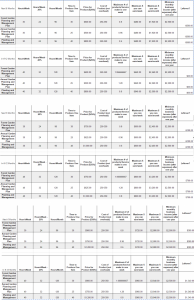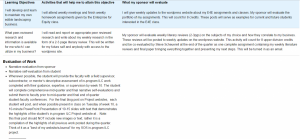Homework Summary Shani Abromowitz
Enterprise for Equity
rbaash@gmail.com
- What, exactly, are you selling?
In my Edible Landscaping Service business I am selling my consultation time in the form of landscape design work and crop planning, as well as implementation and regular maintenance labor. I will be on call for information and advice for an additional fee. This does not include lawn care, carpentry, or load bearing construction.
See Survey spreadsheets.
I’ve conducted two separate customer surveys, the first focused on agroforestry consultation and geared at local farms, conducted over the phone; the second was done in person and geared at the demographics in attendance at the Saturday Downtown Olympia Farmer’s Market.
-Trial one: Over the phone, agroforestry consultation. I looked through the 2016 Farm Map and called 20 farms. Most of them did not answer or call back. One of them hung up on me. Everybody else said they were not interested in agroforestry consultation services. So I changed tactics.
-Trial two: In Person, Edible Landscaping. I went downtown to the Olympia Farmer’s Market between 11-2 and displayed a sign saying “May I ask you four questions for class?” displayed in the performance area. People approached me and volunteered their answers. There seems to be a large possible clientele pool in this demographic alone. Out of the 20 people I interviewed 10 said they’ed be interested in an edible landscaping service, 4 were on the positive side of a maybe, and 6 said no. They consistently priced my service in the $20-$30/hour range. Some people were wondering about my scale of service: a few people had acres of land they were interested in, another had a backyard patio space. Any of the people who said no, they would not be interested in this service, said it was because they could do what I offered by themselves. However, when I followed up on my “Do you know what agroforestry is?” question and answer, most people, including the naysayers, were more interested in what I had to offer.
-Cascadecopia is a Thurston serving landscaping business. They manage everything from design to installation and maintenance. They are on a bigger scale with lots of big equipment and multiple employees. They find it difficult to cope with the economies of scale while making a profit and are barely scraping by.
-Beth Lambach is a Thurston serving small scale gardener. She does everything from planning to installation to maintenance, but she emphasizes that she only works with plants. She doesn’t do carpentry and construction and this has helped her limit how much work she takes on and with who. Keeping her scale small has allowed her to double her profits since last year and slowly grow her business, for ex, buy a chainsaw.
-Edible Landscapes, Va, is a horticultural, greenhouse focused edible landscaping service. They have clientele from all walks of life who are jumping on board the edible landscaping trend. They are a large scale facility with many people in their employ, and they as well struggle with the economies of scale. However due to their customer service strategies they have maintained relationships with clients for over 20 years and have managed to float by on those relations.
Each business has emphasized the importance of scale. They all advise growing the business incrementally and prepping for that growth, vs retrofitting the business. Two of the three businesses find it hard to pay employees and buy the vehicles necessary to keep jobs necessary to employ the workers regularly necessary to maintain the jobs, necessary to pay for everything. Beth finds it simpler to do her job part time, out of the back of her car. She charges clients $40-$50/h for consultation and $25/h for labor. She, like everybody else, stressed how important it was to plan for the seasons, as spring and summer will be the busiest times, followed by fall, and finally winter. There are financial considerations at play here, so how can one diversify throughout the year without scaling up? Beth does this by working multiple jobs, and is comfortable at this pace. She works the weekends however- well over a 40 h workweek, which does not meet the triple bottom line. Finally they all market to homeowners, people who have property they can invest in and the spare change to pay somebody else to do it. The most expensive input the client will need are plants and soil material, which Cascadecopia quoted at being $2000 worth of a $3000 job, which is supposedly on the small side. This seems to be the needle’s eye of the business- finding people who own land and don’t want to install and design everything.
- Regulations/Licenses/Permits
-Business license for each city
-Professional liability insurance
-Limited liability insurance
-Sales Tax/Retail License?
My business will be pretty low-key. I expect I’ll just be helping people garden. The most high-risk thing I’ll be doing is bringing power-tools onto their property, like a chainsaw, or else hauling materials onto their property with a truck. This is to say, I have not started trying to get these licenses or any insurance.
See Start-up and Expansion Costs spreadsheet.
I have few start-up expenses, most of which I can do without, though I’d rather not. The most important is a vehicle. I prefer a truck to haul equipment and would consider getting it used. However, that’s not entirely necessary as I have a temporary vehicle and can borrow my partner’s vehicle at any time, so I can leave that expense for when I have the money.
The second most important is a computer as most of my work will be done on spreadsheets and I will be doing online research. Newegg.com sells computers for as cheap as $200- this would be my first strategy. However I am using a laptop currently and can push this expense to the side until I have the money.
Next important would be designing supplies. I expect I’ll spend no more than $50 on this and can pay it out of pocket.
Then I need a shovel and hand shovel, together costing ~$70. Again, I can pay out of pocket for this. This works in conjunction with the $70 wheelbarrow.
It is important to have a soil auger so I can take a soil sample and see the profile more accurately. These range up to $100 and would be worth the expense. I would pay out of pocket for this.
I need 100 m measuring tape and these can cost $50. I would pay out of pocket.
With these materials I can start planning and designing for my clients. At this point I will have made enough money to buy a drill gun- this would be necessary if the client would like raised beds. They cost ~$70.
Following this idea that I’ll be making steady income, I hope to pay out of pocket for a soil moisture meter which costs ~$100. Then a clinometer to check tree heights at $100 and DBH Tape at $25. Finally I can purchase lingering expenses like rain boots and a work bib, together priced at ~$150.
The total equipment start-up cost: $4005.00 (with vehicle and laptop)
Or: $755.00 (without vehicle and laptop)
The equipment expansion costs revolve around getting a greenhouse and producing cuttings/starts for my clients so that they can purchase these materials directly from me.
I would need to purchase seeds and starts to begin with, and i estimate that at $200. Then I needs soil and pots/bags to put them in, together pricing ~$300. I’d like irrigation equipment to water them with low maintenance, which prices at $`150. All of these items I hope to purchase with income from my business.
The final expense, should I deem it necessary, would be a greenhouse. Greenhouse kits range between $100-$1000 so I’ve priced mine at ~$600.
The total expansion cost: $650 (without greenhouse)
Or: $1250 (with greenhouse)
See Feasibility spreadsheets



